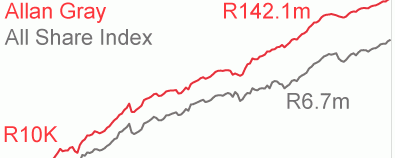I have no empirical evidence. But my gut-feel is were you to ask the smartest young people in South Africa to name their preferred corporate employer, right now Allan Gray, Glencore and Discovery would be at or near the top of the list. Of the three, I’ve had the longest relationship with Allan Gray, first with Simon Marais, then Stephen Mildenhall and now the team under Ian Liddle. And have found the guys there just think differently. Logically. Rationally. Never worrying about voting against about popular perception. The firm’s advertising also reflects this independent attitude. The video of Allan Gray’s “Distraction” advert is embedded into this post – the full two minutes is worth a watch. In this well considered blog, Allan Gray’s Henk Pieterse explains what’s behind its focus by offering four distinct reasons why the firm believes distraction is investing’s enemy. – AH

In an always-on, connected world, distractions abound. Companies and people go out of their way to attract investors’ attention, constantly disseminating their ‘wisdom’ and highlighting investment opportunities through multiple media channels. This constant flood of information tends to feed two unfortunate drivers of investor behaviour, namely fear and greed.
Together, these emotions have destroyed value in countless investment portfolios by causing investors to sell investments when they’re at the bottom of their performance cycles and buy investments at the top of their performance cycles.
The antidote to distraction is focus. Staying focused and committed over the long term is an important part of successful investing. The temptation to change your investment strategy puts your long-term goals in jeopardy.
Investors are not alone in facing distractions. The entire investment chain from asset managers, to stock brokers, independent financial advisers and product providers is subject to the same problem.
While it is important to stay informed, investors can easily be distracted by the constant supply of news and information.
Below are four examples of some of the most common distractions to avoid, particularly when you’re investing for the long term.
1. Macroeconomic predictions
Occasionally financial markets become totally obsessed with a particular issue. The same can be said for many investors, who have added the unconventional actions of central banks to their favourite conversation topics, which include the exchange rate, the price of gold and opportunities in emerging markets. While asset prices have been affected by quantitative easing and will most likely be impacted by its end (called ‘tapering’), it is very difficult, if not impossible, to predict the long-term impact. Investing based on predictions is inherently uncertain.
2. Flavour of the month
The rise of China as an economic powerhouse has been nothing short of spectacular. And with a GDP per capita growth rate consistently above 9% per year since 2000, it should be a fertile source for investment growth. But what makes sense intuitively does not always play out as expected.
When GDP growth is high and things are going well, investors seem to think this will translate into strong future returns for companies in a particular country. In fact, this is often not the case. Strong economic growth often leads to increased competition and a surplus of capital being invested in a specific economy, all of which may result in lower corporate profits.
3. News headlines of the day
It is worthwhile remembering that the headlines are about what is newsworthy, and bad news sells. Knee-jerk reactions are common, with investors selling in haste to avoid further losses. It is human nature to worry about the impact of a specific event on future investment returns. The fact of the matter is that these reactions are usually ill-considered and too late to be of any short-term benefit.
4. Compelling stories
Investors often make investment decisions based solely on a story, with little consideration for the actual valuation. However, when it comes to successful investing, it is the price you pay that counts, not the headlines. It is important to look beyond the story to assess if there truly is an opportunity.
While the above-mentioned examples could all be powerful investment themes, more often than not, what people like to talk about most is not that important when making long-term investment decisions.It is very easy to be distracted from a proven philosophy and to be tempted into solving a short-term crisis with a reactive response.
* Henk Pieterse is the head of marketing at Allan Gray.


